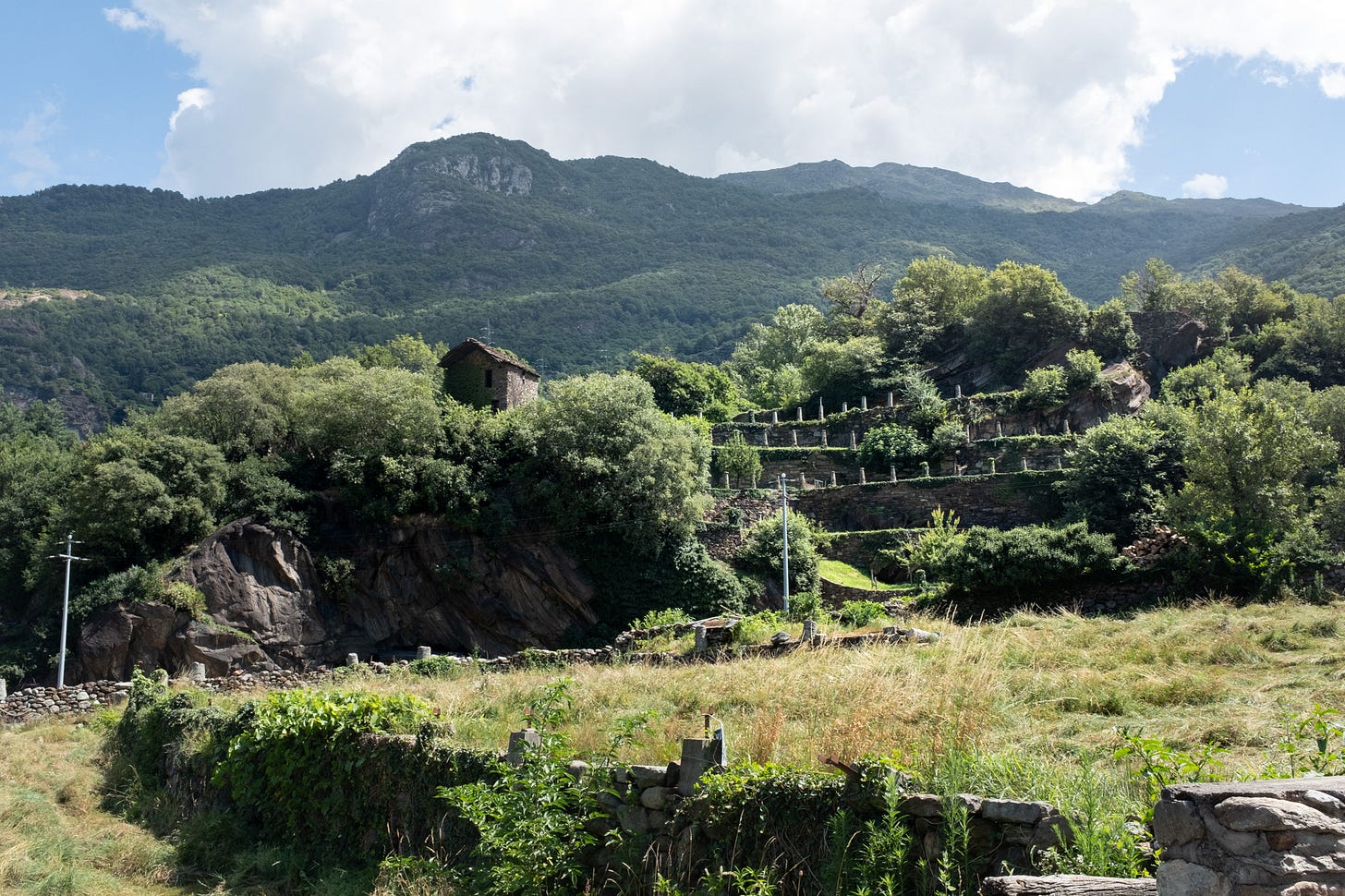Six middle-aged punks sauntered towards the bar. Thick rubber soles on thick leather boots, battered jeans and rock band T-shirts. No different to their youth but for the bulbous bellies bulging in their denim vests and streaks of grey in their hair. They slumped in the chairs opposite at impossibly casual angles, legs dangled over the arms like grapes from a vine.
My phone rang. A sweet, tentative voice in broken English came down the line. It was Rosangela. I said her sister Christina put us in touch and she replied that we could stay. Go to Primo I Maggio square, she’d meet us there and drive us up the mountain to her house.
The square was busy with evening. The gellateria hosted a happy throng under its awnings and so did the bar next door. The older folks had big glasses and haircuts from the 80s. A man was packing up his stall of clothes, sweeping his arms under the railings and tossing the unsold stock into the van. A painting of Bob Marley watched from the back door.
Rosangela arrived in a tiny red Fiat, hairing round the corner, skidding to a halt. She climbed out and shook our hands with a broad beam. The wooden crucifix around her neck swung gently. We should put our bags in the boot she told us grinning. The journey up the mountain was a short and nauseating one. Despite her modest appearance, Rosangela drove like a racing driver, dropping gears in the bends, surging through the hairpins. She smiled all the way.
Feeling her way through steady translations, we learned Christina was not her sister, she was a nun, and lived with Rosangela in their hermitage on the mountainside. Sister Christina was not there today though, she was visiting her mother.
The hermitage was unsurprisingly modest. Two stories one room deep with a white terrace facing the valley. A plum tree dangling yellow fruit occupied the small garden between the house and the steep hillside. Rosangela showed us our room and said that supper would be ready for 8. On the table in our room was a Church magazine printed on rough paper. It was left open at a page that showed Sister Christina at an alter and Rosangela, draped in the white robes of an altar server behind. The spread was about Sister Christina and her musical talents. She had a haircut from the 80s too.
At 8 we went next door and carefully sat at the round table in the parlour. Rosangela had laid out cutlery, plates, a bowl of plums from the tree and a round bottle of olive oil. She came out of the kitchen all smiles and refused our offers of help, placing large bowls of turmeric rice, salad and an omelette each. The eggs came from her neighbour Arturo just down the hill.
There was a community of eight or so that lived around here, she told us. They helped support Sister Christina in her hermetic life. They hosted pilgims on a pay-what-you-want basis and sometimes had BnB guests on their way to the mountains. In February, a man called Tomas had stayed. He was one of Italy’s best-known mountaineers and his book was also on the table in our room. She told us that tragically he had died on an expedition in Peru a few weeks before, stepped out of his bivouac one morning and the cornice of rock and snow gave way beneath him. Mountains can be fickle we reflected. She said that he was at peace with God in the mountains now.
The next morning she drove us back to the town. With gravity in her favour, the descent was even faster and more nauseating. Once again, the pace of the car nor the challenge of the bends could faze her and she spoke to us as genially as ever. She mentioned the British pilgrims she’d hosted the previous night, talked about Gladioli flowers which meant ‘little swords’ and talked about her cat Nouvoletta whom we’d only glimpsed. She was a hermit cat, very shy, and the name meant ‘little cloud’. When she was a kitten she was white and grey with blue eyes like the sky.
Rosangela dropped us where she’d picked us up. The square was almost empty this early in the morning but for the same man setting up his railings of clothes. Bob Marley still playing his guitar on the back door. She wished us luck in our day’s walk and we thanked her very much.
We hitched our backpacks and struck off, passing the bar where the punks had been slumped and crossing the Roman bridge, the gateway to the rest of Italy. The Aosta Valley was now behind us. The day’s terrain was almost unrecognisable to the previous few. Gentle terraces with vineyards, propped up with dry stone walls and lined with stone columns that held nothing up and looked like the romantic ruined gardens of antiquity.
My brother and I reflected on the view. When you walk through a landscape you absorb its changes, feel the topography. You internalise it. We were coming out of the mountains, seeing them soften and relax, an animal settling into sleep. The ferocious peaks out of sight, now just gentle hills, soon nothing but flat. Thomas had a long way to Rome and I thought how lucky he was that he could chew and swallow every hill and valley between here and there, recording them somewhere inside.
That’s what walking gets you that nothing else can. Not even hitchhiking.






